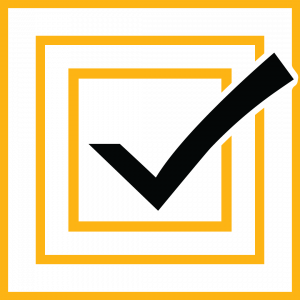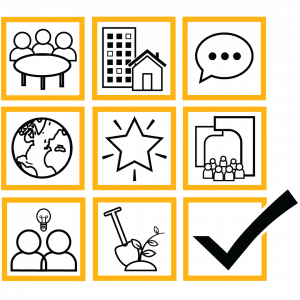UMBC is a national leader in civic and political engagement, and part of what makes our community special is our deep commitment to thinking about political engagement not simply as checking a box on a ballot, but also as the set of holistic ways of thinking and acting that allow every member of our community to be engaged in processes to help build a better world. On this page, you will find UMBC-specific resources to understand our approach to electoral engagement.
UMBC’s Approach to Electoral Engagement
These four ideas are at the core of UMBC’s approach to voter engagement:

Voting Is Easy.
Navigating aspects of the voting process can be done using the Center for Democracy and Civic Life’s Voter Information and Registration webpage, which includes links to local resources as well as ALL IN to Vote’s tools. Take action early so every vote will count.

Voting Matters.
The impact of elections on the quality of our lives, and our prospects for the future, is enormous. Even though your one vote may not decide the election, it can influence elected officials’ priorities, actions, and decisions, because your choice to vote or not vote will be a matter of public record. When you participate, you declare that you and people in your age group and connected to UMBC matter. Read more about why your vote matters here.

UMBC Students Vote.
UMBC won a Gold Award from the ALL IN Campus Democracy Challenge for its 113% increase in student voter turnout in the 2018 election (relative to 2014). 82.5% of UMBC students were registered to vote in the 2020 national election; of that number, 83.9% actually voted. UMBC’s overall turnout rate in 2020 was 104.8% of the national average for colleges and universities (source: National Study of Learning, Voting, and Engagement (NSLVE)).

Cast Your Whole Vote.
“Casting your whole vote” means committing fully to building strong, inclusive, just communities in which everyone can thrive. The idea comes from Henry David Thoreau’s essay on Civil Disobedience. Thoreau observed that in the 19th century there were a lot of people who complained about what the government did or did not do, but took no real responsibility. They might vote in elections, but they did not learn about the issues, engage in conversations with members of their community, and contribute their time and talent to building a better world. Thoreau urged them to “cast your whole vote, not a [ballot] merely, but your whole influence.”
For many years, UMBC has pursued innovative approaches to civic learning and democratic engagement that align with Thoreau’s message, foregrounding the capacity of people at UMBC as agents and co-creators of their communities and democracy. These approaches orient members of the campus community to democracy as a way of life enacted both in formal political processes and in everyday settings such as neighborhoods, workplaces, student organizations, and classrooms. They challenge aspects of our broader U.S. civic culture that reduce citizenship to consumer participation and voting to a transaction.
Our hope at the Center for Democracy and Civic Life is to support people at UMBC in embracing civic involvement as an everyday, lifelong commitment rather than episodic fulfillment of civic duties. Fulfilling this hope is necessarily a shared responsibility of every member of the campus community. Please connect with us if you have ideas about how to deepen and extend UMBC’s civic ethos by emailing civiclife@umbc.edu.
Faculty Toolkit for Classroom Conversations
Are you an instructor looking for guidance on how to have healthy, productive conversation about politics and the election in the classroom?
- The Election 2024 Working Group came up with this guide for how to communicate about the election in ways that are aligned with UMBC’s approach to political engagement.
- Go to our Events and Programs page to find the “Politics in the Classroom” workshops we will be hosting.
- We have put together a brief guide with tips for activities instructors can use to foster healthier dialogue in classrooms.
- The Constructive Dialogue Institute’s Maintaining Campus Community During the 2024 Election guide provides helpful guidance for faculty on co-creating conversation norms in the classroom, encouraging dialogue across difference, assigning election-related activities, fostering media literacy, and welcoming students to a culture of engaging in political dialogue in generative ways.
Using Your Voice at UMBC
Students have long used their voices to enact change at colleges and universities as well as the world beyond. Click this link for information about how UMBC thinks about freedom of speech and expression as well as helpful guidance if you hope to use your voice at UMBC to engage others in political and social issues.
UMBC Voter Engagement Plans and Reports
Voter Friendly Campus Designation:
- 2022 Voter Friendly Campus Designation End-of-Year Report
- 2022-2025 Voter Friendly Campus Engagement Plan
- 2020 Voter Friendly Campus Designation End-of-Year Report
- 2020-2023 Voter Friendly Campus Engagement Plan
National Study of Learning, Voting, and Engagement (NSLVE) Data: